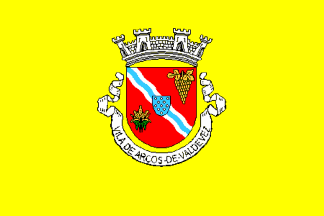
Last modified: 2007-06-09 by antónio martins
Keywords: arcos de valdevez | coat of arms | vez | corn | quina: 11 plates | grapes: 1 (golden) | vez river | waves: 3 |
Links: FOTW homepage |
search |
disclaimer and copyright |
write us |
mirrors

The flag is, according to my sources, yellow (there is always some
uncertainty when the sources show a plain background: it may be wrong) with
the arms at the centre. These are typical, with a 4-towered mural crown, a
scroll reading "VILA DE ARCOS-DE-VALDEVEZ", and a
shield, red with a white-blue-white wavy diagonal band. In the right chef
there is a golden bunch of grapes (nothing too unusual) and in the left
"counterchef" some plant that looks vaguely like corn. In the centre, an
old portuguese escutcheon with 11 bezants.
Jorge Candeias, 30 Sep 1998
My guesses on the meaning of theses arms are that the wavy stuff refers
to either river Vez that passes by the head of the municipality ("Valdevez",
from "Vale de Vez", means "Valley of Vez", so the place’s name can be
translated as "Arches of Valley of Vez") or to river Lima that makes the southern
border of the municipality (or to both). The plant stuff relates probably to the
main products there (this area is famous for it’s wine — Vinho Verde). The
escutcheon is probably a sign of the medieval owners of that land, the crown.
Jorge Candeias, 30 Sep 1998
Plain (monocolored) portuguese subnational flags are
not allowed to have armless
variations: plain flags always carry the coat of arms.
Jorge Candeias, 18 Jul 1999
Arcos de Valdevez is a town located in the North of Portugal. It belongs
to the district of Viana do Castelo, old province
of Minho and possibly future region of Entre Douro
e Minho. The municipality has an area of 445.9 km² and a population of
nearly 26 000 inhabitants distributed in 51 (!) communes. It’s a rural
municipality and a beautiful one. A good portion of it’s territory is integrated
in the only portuguese national park, also the oldest protected area in Portugal,
the National Park of Peneda-Gerês
Jorge Candeias, 30 Sep 1998
Anything below this line was not added by the editor of this page.